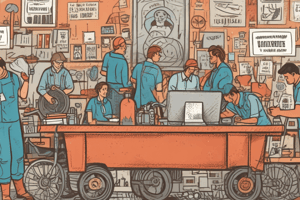Podcast
Questions and Answers
What is unionization?
What is unionization?
Unionization occurs when a group of employees establish a labor union to negotiate collectively for better working conditions, wages, and benefits.
How does unionization benefit employees?
How does unionization benefit employees?
Unionization gives employees a vital bargaining tool to negotiate improved working conditions, wages, and benefits.
What is the significance of a labor union becoming legally recognized?
What is the significance of a labor union becoming legally recognized?
Once a labor union is legally recognized, it gains the authority to engage in collective bargaining on behalf of its members.
Name a notable labor union representing educators and education professionals.
Name a notable labor union representing educators and education professionals.
What is the main purpose of a labor union?
What is the main purpose of a labor union?
Which labor union represents public sector employees?
Which labor union represents public sector employees?
When was the National Labor Relations Act, also known as the Wagner Act, established?
When was the National Labor Relations Act, also known as the Wagner Act, established?
What significant improvements in workers' rights have labor unions contributed to?
What significant improvements in workers' rights have labor unions contributed to?
What role do labor organizations play in collective bargaining processes?
What role do labor organizations play in collective bargaining processes?
What right did the Wagner Act grant to workers in the United States?
What right did the Wagner Act grant to workers in the United States?
Flashcards are hidden until you start studying
Study Notes
Labor Organization: Understanding Workers' Rights and Unionization
Introduction
Labor organizations play a crucial role in advocating for workers' rights and improving their working conditions through unionization. They act as intermediaries between workers and management during collective bargaining processes, ensuring that the voices of employees are heard and their needs are considered. In this article, we will delve into the concept of labor organizations, discussing the importance of workers' rights and unionization in achieving fair and equitable treatment for workers.
What is a Labor Union?
A labor union is an association of workers that seeks to protect, maintain, and advance the rights and interests of its members. Established in Philadelphia in 1794, labor unions have a long history in the United States and have contributed to significant improvements in workers' rights, including safer working conditions, better wages, and reduced working hours.
Workers' Rights
In the United States, the National Labor Relations Act of 1935, also known as the Wagner Act, granted workers the right to form unions and collectively bargain for improved working conditions and wages. Since then, several amendments have strengthened and expanded these rights, ensuring that workers have a voice in matters affecting their employment. However, despite these legislative measures, there have been challenges to workers' rights, such as the introduction of right-to-work laws in 27 states and restrictions on public employees paying union dues.
Unionization
Unionization occurs when a group of employees come together to establish a labor union. This process allows them to negotiate as a collective force, providing strength in numbers to address issues related to wages, working conditions, and other workplace concerns. Once a majority of the employees in a given workplace have voted to unionize, the union becomes legally recognized, giving it the authority to engage in collective bargaining on behalf of its members.
Some of the notable unionizations in various sectors include the National Education Association (NEA), representing educators and other education professionals, and the American Federation of State, County, and Municipal Employees (AFSCME), representing public sector employees.
Conclusion
Labor organizations, particularly labor unions, serve as vital institutions that protect workers' rights and advocate for their interests. By fostering unionization, employees gain an essential bargaining tool to negotiate better working conditions, wages, and benefits. Despite challenges and controversies surrounding unionism, its role in promoting worker empowerment and driving social change remains undeniable.
Studying That Suits You
Use AI to generate personalized quizzes and flashcards to suit your learning preferences.




